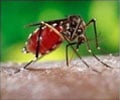Novel drug target identification might help combat several other mosquito-transmitted flaviviruses.
- Several viral diseases are transmitted via mosquitoes that act as transmitters or vectors which transfer lethal viruses inside human hosts
- Human enzymes that are required by these viruses for further replication inside human body were identified
- Future drugs that targets these enzymes can help in stopping vector-borne diseases
Other viral diseases transmitted by mosquitoes vectors include Chikungunya, Zika fever, Yellow fever, West Nile fever and Japanese encephalitis.
The burden of these diseases is highest in tropical and subtropical countries and time and again, several outbreaks have claimed lives, and overwhelmed health systems in many countries (1✔ ✔Trusted Source
Vector-borne diseases
Go to source).
Research Highlights: New Drug Targets Identified
The research, published recently in the journal Cell Host and Microbe, has unveiled a previously unknown target for antiviral drug development. Direct targeting of essential viral enzymes has long been a major strategy of antiviral drug design. Although researchers have been previously successful in targeting several viral enzymes, targeting viral helicases has been very difficult to achieve, demanding alternative strategies.The study has provided a molecular insight into how these group of viral enzymes known as Helicases can be targeted by mediating by a specific isoform of the host (human) enzyme known as KAT5.
The KAT5 enzyme plays a critical role in the virus replication and being able to target it is the key first step in being able to design drugs to stop viral replication and treat infection (2✔ ✔Trusted Source
Acetylation of the NS3 helicase by KAT5γ is essential for flavivirus replication
Go to source).
Benefits of the Study: What Have We Gained?
- The study has paved way for developing new drug treatments for these viral infections
- We are now a a step closer to understanding and treating mosquito-transmitted pathogens, which are a global threat to the human population
- Antiviral drug resistance: Viruses mutate so rapidly that developing medicines against them lose their potential over time. This is known as Anti-viral resistance. The new target identified are human enzymes which are basically protein. The do not undergo any significant mutation over time
- The study suggests that creating novel drugs targeting the human KAT5 enzyme might help target several other mosquito-transmitted flaviviruses
- Since currently no licensed vaccine or specific antiviral treatment is available for the viral infection caused by mosquito borne transmission, the current drug target offers a novel breakthrough in preventing virus borne infections caused predominantly by flaviviruses
Other Strategies to Prevent Vector Borne Infections
Personal Protection:
This warrants the use of protective clothing, nets and application of mosquito repellant creamsInsecticides:
Several insecticidal compounds have been advocated for indoor and outdoor useEnvironmental management:
Removal of mosquito breeding sites, Fogging and prevention of any collection of water that could serve as site for mosquito breeding is importantLong-lasting insecticidal nets (LLINs) and Indoor Residual Spraying (IRS):
account for most of the reductions in malariaRecent advances:
Larvicides, bio insecticides and technologies for improving the incorporation of insecticides and repellents into clothing and other materials
Novel control strategies for mosquito-borne diseases
Go to source).
References:
- Vector-borne diseases - (https://www.who.int/news-room/fact-sheets/detail/vector-borne-diseases)
- Acetylation of the NS3 helicase by KAT5γ is essential for flavivirus replication - (https://www.cell.com/cell-host-microbe/fulltext/S1931-3128(23)00264-0)
- Novel control strategies for mosquito-borne diseases - (https://royalsocietypublishing.org/doi/10.1098/rstb.2019.0802)
Source-Medindia















